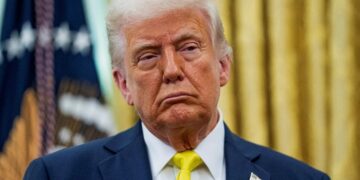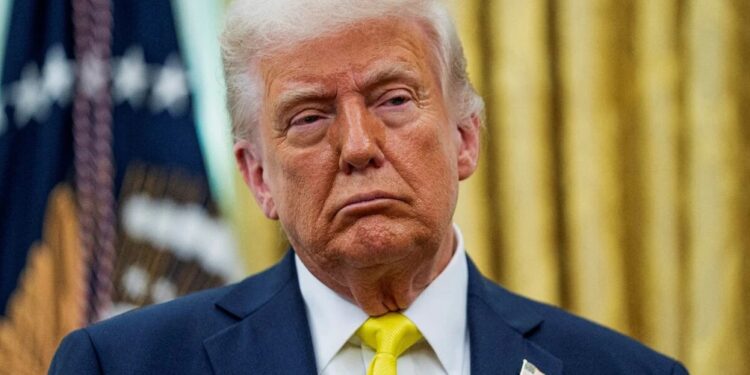In the aftermath of the Pahalgam attack and Operation Sindoor, India’s diplomatic landscape has been significantly shaped by the United States’ stance on the escalating tensions with Pakistan. Despite condemnation of the Pahalgam assault by the US and other global powers, the impact of these statements appears minimal from India’s perspective as they fail to directly address Pakistan’s involvement in the attack.
Former US President Donald Trump has displayed a tendency to issue impulsive diplomatic remarks without sufficient consideration of their long-term consequences. While his intentions may not necessarily be malicious, his approach is marked by exaggerated claims of success, followed by abrupt policy reversals. This unpredictable diplomatic style has earned him a reputation for prioritizing optics over substance, as demonstrated by his inconsistent statements on India-Pakistan tensions.
Trump’s penchant for self-promotion and his tendency to make sweeping statements without comprehensive understanding has made him a controversial figure in South Asian geopolitics. Given his position as the leader of the most powerful nation, Trump’s remarks carry significant weight. Consequently, India must navigate these unpredictable statements carefully, recognizing the potential impact of his impulsive comments on bilateral and regional stability.
Giving a Pass to Pakistan
India was caught off guard by Trump’s stance on the recent military standoff with Pakistan, especially given the US’s initial reaction to the Pahalgam terror attack, which was sponsored by Pakistan. The attack occurred while US Vice-President JD Vance was on an official visit to India, a strategic move reminiscent of previous instances where Pakistan timed its attacks to coincide with high-profile US visits.
Despite Trump’s publicly stated opposition to Islamic extremism, his response to Pakistan’s involvement in the Pahalgam attack was notably subdued. While the attack was condemned, the US refrained from explicitly naming Pakistan as the perpetrator. This restraint undermines India’s efforts to hold Pakistan accountable for its ongoing sponsorship of terrorism.
The UNSC and G7 Statements: A Missed Opportunity
The United Nations Security Council (UNSC) issued a press statement condemning the Pahalgam attack but stopped short of naming Pakistan. With Pakistan currently holding a seat on the UNSC, obtaining a more direct condemnation was unlikely. The UNSC statement vaguely called for holding the “perpetrators, organizers, financiers, and sponsors” accountable without explicitly identifying Pakistan.
Similarly, the G7 statement was equally ambiguous. Despite the participation of several Quad members and strategic partners like France and the UK, the G7 avoided attributing blame to Pakistan. The US’s insistence on downplaying Pakistan’s role in the attack and focusing solely on de-escalation effectively placed India and Pakistan on the same level, ignoring the root cause of the conflict — cross-border terrorism.
The Myth of Diplomatic Solutions
Calls for a “diplomatic solution” to terrorism are inherently flawed. India has engaged in numerous diplomatic dialogues with Pakistan, all of which have been rendered ineffective by Pakistan’s persistent support for militant groups. The composite dialogue process, initiated after the 2008 Mumbai attacks, was repeatedly derailed by Pakistan’s refusal to act against terror networks operating within its borders.
The US and other Western powers have often leveraged military force in their “war on terror,” yet they advocate for diplomatic solutions when India faces similar threats. This double standard undermines India’s security concerns and trivializes the impact of state-sponsored terrorism.
US Inconsistency: From Indifference to Hyperactivity
Initially, Trump’s reaction to the India-Pakistan confrontation was one of detachment. US Vice-President JD Vance publicly stated that the US would not get involved in a conflict that had “nothing to do with America’s ability to control it.” This stance was relatively neutral and implied a hands-off approach.
However, Trump soon shifted to a hyperactive stance, announcing a ceasefire even before India and Pakistan had agreed to it bilaterally. This abrupt change not only embarrassed India but also created the impression that New Delhi had succumbed to US pressure. Furthermore, Trump’s comments suggested that he had brokered the ceasefire, effectively diminishing India’s strategic leverage.
Trump’s Trade Threat: A Miscalculated Strategy
In a bid to exert leverage, Trump warned that the US might cut trade ties with both India and Pakistan if the two nations did not comply with his ceasefire directive. This threat, however, was largely symbolic given the disparity in trade volumes. US trade with Pakistan amounted to $7.4 billion in 2024, while its trade with India stood at a substantial $200 billion.
India’s response to Trump’s remarks has been measured. Prime Minister Narendra Modi and other senior officials have sought to downplay the US’s claims by emphasizing that the ceasefire was initiated by Pakistan, not the US. Nonetheless, Trump’s persistent remarks about mediating between India and Pakistan disregard India’s longstanding opposition to third-party intervention in the Kashmir issue, as enshrined in the Simla Agreement.
Implications for India-US Relations
Trump’s impulsive approach to South Asian geopolitics raises concerns about the future trajectory of India-US relations. While the US remains a crucial strategic partner, India must now recalibrate its strategy to address the potential fallout from Trump’s unpredictable diplomatic style.
One approach would be to adopt a firmer stance against unwarranted US interventions in India-Pakistan disputes. By clearly articulating its position on third-party mediation and reiterating its commitment to bilateral conflict resolution, India can mitigate the impact of Trump’s erratic statements.
Additionally, India must engage with other global powers, particularly those in the Quad and the G7, to build a consensus on the need to hold Pakistan accountable for its continued support of terrorism. By aligning its diplomatic outreach with broader international efforts to counter state-sponsored terrorism, India can strengthen its position on the global stage.
Conclusion
Trump’s inconsistent approach to the India-Pakistan conflict underscores the challenges India faces in dealing with an unpredictable US administration. While the US remains a vital ally, India must remain vigilant against attempts to equate it with Pakistan, particularly in the context of state-sponsored terrorism. By asserting its strategic autonomy and reinforcing its commitment to bilateral conflict resolution, India can effectively counter the narrative of parity and safeguard its national interests amid evolving geopolitical dynamics.
Also Read : Irrfan Khan’s Epic Response to Pakistani Reporter on Visiting Pakistan – Old Video Goes Viral















 Categories
Categories









